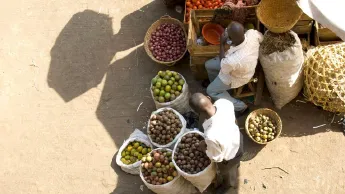Jobs and opportunities for young people
- 2022-07-18
- Christina Pfänder
- Comment

Avocados, pineapples, mangoes and passion fruit: Uganda can offer a wide range of delicious fruit and vegetables, but also popular varieties of coffee and tea. Gyaviira Kaleebu sees huge potential in Uganda’s fertile soils and wants to use agricultural processing factories to improve the economic situation in his country.
Mr Kaleebu, the export of agricultural products represents a major part of Uganda’s gross domestic product. What exactly is the advantage of processing factories?
These factories enable us to add value, which directly benefits Ugandan farmers. This initially involves us specialising in the processing of coffee and indigenous varieties of fruit and vegetables like pineapples, oranges, lemons, palm nuts, eucalyptus, guavas, medlars, avocados, mangoes, aubergines, and gooseberries. The thinking behind this is to obtain a higher price compared to the raw product, as juice or fruit concentrate for example. The same applies to the sale of coffee: a significantly larger proportion of the value creation remains in our country if we roast and package the beans here in Uganda. And Ugandan coffee enjoys a high international reputation due to its intense flavour: we’re the world’s second largest exporter of robusta beans. At present, however, the facilities are still under construction. We’re looking for financial support, since we can’t raise the required capital of 783,757 US dollars on our own. The owners of the agricultural factories will be seven farming associations from the Masaka District, which can independently determine their own products.
To what extent will these facilities help to overcome the social and economic challenges in Uganda?
One of Uganda’s issues is subsistence farming, in other words our farmers mostly produce to cater for their own needs. The processing factories would mean that we can form larger units in the agricultural sector. This creates jobs, eliminates poverty and ensures higher agricultural productivity. The factories therefore also counteract the massive emigration of our young people to the United Arab Emirates, as well as to Europe and Asia. You need to know that around 70 per cent of our 44 million inhabitants are not even 25 years old. We have to prevent them leaving, because Uganda needs its workforce – the factories will create numerous new jobs and associated opportunities, even for young people without training. At the same time, this enables us to increase export revenues and helps the country to achieve middle-income status. We also want to use the profits from the factories to promote the schooling of orphans and to fund women-owned businesses.
The former British Prime Minister Winston Churchill once described Uganda as the ‘pearl of Africa.’ Was he right?
Yes, definitely. I invite everyone to see for themselves the beauty of our country and its potential! Uganda is home to a wide range of wildlife, such as elephants, lions, leopards, chimpanzees and rare bird species. The equator runs through the south of our country, so we benefit from high levels of sunshine. Another plus point is sufficient water: Uganda benefits both from Lake Victoria, the largest lake in Africa, as well as the Nile, the longest river in the world. That’s perfect for our agriculture.
